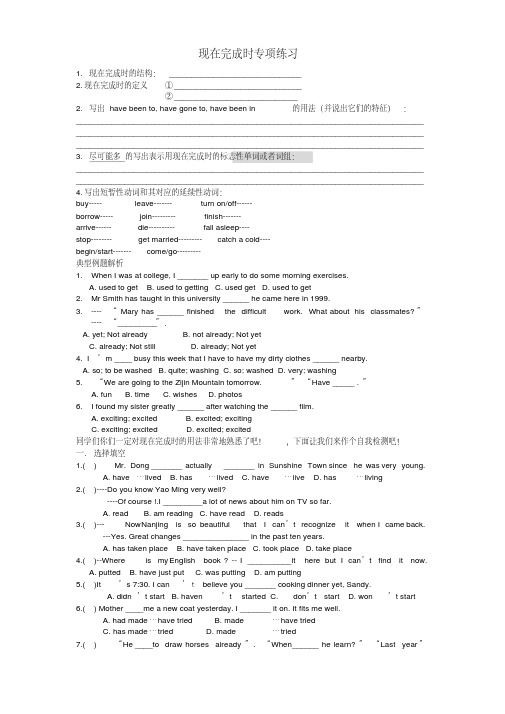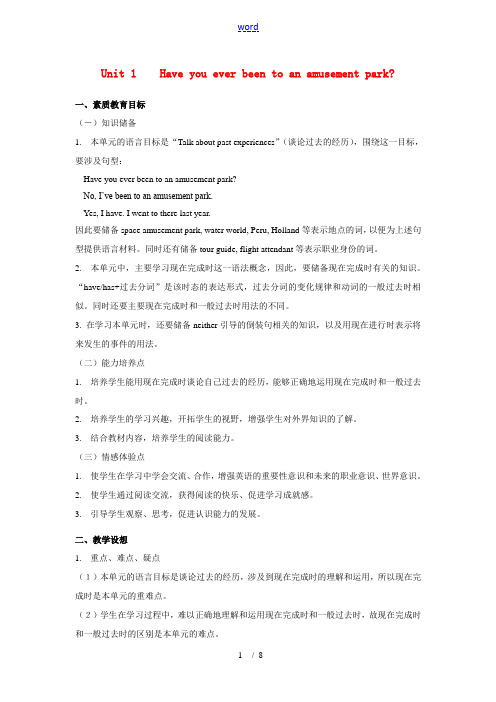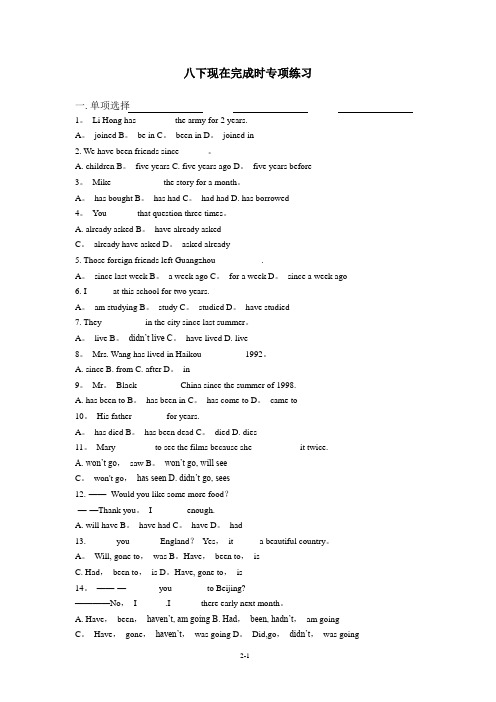八年级英语下册专题1havebeento、havebeenin、havegoneto辨析(易错考点回
2020年春人教新目标英语八年级下册unit8知识点分析与练习(无答案)

2020年春人教新目标英语八年级下册Unit8 Have_you_read_Treasure_Island_yet?知识点一、重点短语:1.听说hear of2. 像……一样be like3. 出去go out4. 充满full of5. 做完某事finish doing sth6. 关于be about7. 长大grow up 8. 把…放下put …down9. 快点hurry up (in a hurry匆忙地) 10. 造船make a boat11.带回bring back 12.放弃give up13. 等待wait for 14. 砍倒cut down15. 为了食物而杀…kill…for food16. 还有谁who else17.看见某人正在做某事see sb. doing sth. 18. 向(朝)……跑去run towards19. 给某人取名为……name sb.…20. 迫不及待做某事can’t wait to do sth.21.过去常常used to22. 争吵fight over23. 回家return home 24. 在收音机上on the radio25. 使某人做某事make sb. do sth 26. 逐渐认识到come to realize27. 自从……以来ever since 28. ……的家the home of29. 例如such as 30. 属于belong to31. 对某人友好be kind to sb 32. 互相信任trust one another33. 使某人想起……remind sb. that…34. 去过…have been to35. 研究do research on 36. 希望做某事hope to do sth37. 介绍……给……introduce …to38. 失去生命lose one’s life39. 去出国/ 出国学习go / study abroad 40. 数以百万计的;无数的millions of二、重点句子:讲一讲1现在完成时(section A)1.2. 过去分词与过去式的变化相同。
八年级英语下册 Unit 2 Travelling Grammar知识点拨 译林牛津版 教案

Unit 2 Travelling一、教学内容:Unit 2 TravellingGrammar二、教学目标:掌握Unit2的词法结构和用法:1. so…that /such…that/enough to/too…to…2. have/has been in, have/has been to, have/has gone to3. 延续性与短暂性动词经典讲解Grammar 1:so…that /such…that/enough to/too…to…解释:如此……以至于……so+ adj. /adv. +that从句或such+单/复数名词+that从句例:It’s so hot in summer that we can’t do without the air conditioner.夏天的天气热的我们少不了空调。
The teacher spoke so fast that I couldn’t understand what he was saying.老师讲得太快以致于我听不懂他在说什么。
He is such a genius that he doesn’t have to study much for exams.他是个天才,所以他考试都不用怎么念书。
They are such good basketball players that everybody wants to watch their games.他们个个都是很棒的篮球员,所以每个人都想去看他们打球。
表示:足以做某事enough to… 如: He is old enough to do it.意思是太……而不能too...to… 例: He is too young to go to school.中考so…that, too…to和enough to都是初中英语教材中的重要结构,在一定条件下它们可以相互转换,并经常成为中考考查的热点之一。
八年级英语下册现在完成时专项练习牛津版

现在完成时专项练习1. 现在完成时的结构:______________________________2.现在完成时的定义①_____________________________②____________________________2. 写出have been to, have gone to, have been in 的用法(并说出它们的特征):_____________________________________________________________________________________________________________________________________________________________________________________________________________________________________________ 3. 尽可能多的写出表示用现在完成时的标志性单词或者词组:______________________________________________________________________________________________________________________________________________________________ 4.写出短暂性动词和其对应的延续性动词:buy----- leave------- turn on/off------borrow----- join--------- finish-------arrive------ die---------- fall asleep----stop-------- get married--------- catch a cold----begin/start------- come/go---------典型例题解析1.When I was at college, I _______ up early to do some morning exercises.A. used to getB. used to gettingC. used getD. used to get2.Mr Smith has taught in this university ______ he came here in 1999.3.----“ Mary has ______ finished the difficult work. What about his classmates?”----“_________”.A. yet; Not alreadyB. not already; Not yetC. already; Not stillD. already; Not yet4. I’m ____ busy this week that I have to have my dirty clothes ______ nearby.A. so; to be washedB. quite; washingC. so; washedD. very; washing5.“We are going to the Zijin Mountain tomorrow.”“Have _____ .”A. funB. timeC. wishesD. photos6.I found my sister greatly ______ after watching the ______ film.A. exciting; excitedB. excited; excitingC. exciting; excitedD. excited; excited同学们你们一定对现在完成时的用法非常地熟悉了吧!,下面让我们来作个自我检测吧!一. 选择填空1.( ) Mr. Dong _______ actually _______ in Sunshine Town since he was very young.A. have …livedB. has…livedC. have…liveD. has …living2.( )----Do you know Yao Ming very well?----Of course !.I _________a lot of news about him on TV so far.A. readB. am readingC. have readD. reads3.( )---Now N anjing is so beautiful that I can’t recognize it when I came back.---Yes. Great changes _______________ in the past ten years.A. has taken placeB. have taken placeC. took placeD. take place4.( )--Where is my English book ? --I __________it here but I can’t find it now.A. puttedB. have just putC. was puttingD. am putting5.( )It’s 7:30. I can’t believe you _______ cooking dinner yet, Sandy.A. didn’t startB. haven’t startedC. don’t startD. won’t start6.( ) Mother ____me a new coat yesterday. I _______ it on. It fits me well.A. had made…have triedB. made…have triedC. has made…triedD. made…tried7.( ) “He ____to draw horses already”. “When ______ he learn?” “Last year” A.learned...has B. learned...did C. has learned...has D. has learned (i)8.( ) Tom _____up into the tree. Look, he ____ high up there !A. has get…isB. has climbed…wasC. got …wasD. climbed…is9.( ) ____ you _____ the text _____ ? Yes, we ____ it two hours ago.A. Did…copy…yet…didB. Have…copied…already…haveC. Have…copied…yet…didD. Did …copy…ever…had10.( ) ---Have you got the plan ready ______? ---No,_________.A. already , not yetB. yet , not yetC. already , I haven’tD. ever ,not yet二. 用动词的正确形式填空1. We ________________(study ) in Little Star English since two years ago.2. ---__________Oxfam Trailwalker ___________(be) one of Hong Kong’s biggestfund-raising events since 1981? ---Yes , it__________.3. Tsunami ______________(not happen) in the south-east of China recently.4. My father ___________ (read) the novel twice.5. --- The door is open. Who ______ (open) it? Do you know?---- Sorry, I don’t know.6. ----She ______________(buy) a Hello Kitty for you , hasn’t she?---Yes, she _______.She __________(buy) it in Sanrio Puroland last summer.7. This is the nicest park I __________(see).8. ---Are you sure you_______________(lose) your dictionary?---Yes, I _______________(look) for it everywhere , but I still can’t find it.9. The children _________ (enjoy) themselves in the party last Sunday morning..10. They _________ (study) English for a long time.三.句型转换1. The dress is very beautiful. I want to buy it very much. (同义句)The dress is beautiful I want to buy it very much.2. He can help us because he has organized a charity show before. (对划线部分提问)________________ ____________ he _____________ us?3. I wonder who can join in this party. (同义句)I wonder who can ________ _________ _______ this party.4. To join the Riding Club is fun. (用it改写)____________ is ___________ __________ _________ the Riding Club.5. We learnt Japanese last year. (同义句)Japanese ______ ________ _____ _____ ______ ________ .6. I have known Sandy since three years ago. (对划线部分提问)___________ ___________ ____________ you ________ Sandy?7. They borrowed the book three days ago. (同义句)They ____________ _______________ the book ____________three days.8. He is watching TV now. (用at that time改写)He ______________ ____________ TV at that time.9. I’ll show my friend these photos when I come back. (同义句)I’ll show these photos my friend I come back.lie spent at least 50 yuan on the dictionary. (同义句)Millie at least 50 yuan the dictionary.Millie at least 50 yuan the dictionary.The dictionary Millie at least 50 yuan.11.It is three days since he died. (同义句)Three days_____ ______since he died.It ____ _____ three days since he died.四. 根据汉语提示完成句子1.你最近收到你爸爸的来信了吗?_______ you ______ ________ your father _________ ?2. 我已经很长时间没有拜访过我姑姑了。
八年级英语下册 Unit 9 重点词组

八年级英语下册 Unit 9 重点词组1. have been to 到过某处(现在已回来)Have gone to 到某处去了(现在还没有回来) Have been in/at 在某处呆了多久2. an amusement park 游乐园3. a water park 水上公园4. a roller coaster 过山车5. see sb. doing sth. 看见某人正在做某事see sb. do sth. 看见某人做了某事6. walk around 四处走动7. take a ride 兜风8. on board 在船上9. take different routes 走不同的路线10. end up with sth 以…结束end up doing sth 以做某事结束11. argue with sb. 与某人争吵12. an English-speaking country 说英语的国家13. an exchange student 交换生14. a flight attendant 一名机组乘务员15. a tour guide 导游16. such as 例如For example例如(后用逗号隔开)17. listening skills 听力技能18. in Southeast Asia 在东南亚19. take a holiday 度假20. three quarters 四分之三21. have problems (in) doing sth. 做某事很费劲22. during the daytime = in the day 在白天23. all year round 全年,一年到头24. wake up 醒来,唤醒,叫醒25. think about/of doing sth 思考做某事26. so much fun如此多的乐趣27. welcome to 欢迎来到28. be welcomed by受到…欢迎29. think about 考虑30. think of 想起;认为31. rather than 宁可;而不是32. neither…nor…既不…也不…33. on the one hand,…on the other hand,…. 一方面…,另一方面…。
八年级英语下册:Unit 1 Have you ever been to an amusement

Unit 1 Have you ever been to an amusement park?一、素质教育目标(-)知识储备1.本单元的语言目标是“Talk about past experiences”(谈论过去的经历),围绕这一目标,要涉及句型:---Have you ever been to an amusement park?---No, I’ve been to an amusement park.---Yes, I have. I went to there last year.因此要储备space amusement park, water world, Peru, Holland等表示地点的词,以便为上述句型提供语言材料。
同时还有储备tour guide, flight attendant等表示职业身份的词。
2.本单元中,主要学习现在完成时这一语法概念,因此,要储备现在完成时有关的知识。
“have/has+过去分词”是该时态的表达形式,过去分词的变化规律和动词的一般过去时相似。
同时还要主要现在完成时和一般过去时用法的不同。
3. 在学习本单元时,还要储备neither引导的倒装句相关的知识,以及用现在进行时表示将来发生的事件的用法。
(二)能力培养点1.培养学生能用现在完成时谈论自己过去的经历,能够正确地运用现在完成时和一般过去时。
2.培养学生的学习兴趣,开拓学生的视野,增强学生对外界知识的了解。
3.结合教材内容,培养学生的阅读能力。
(三)情感体验点1.使学生在学习中学会交流、合作,增强英语的重要性意识和未来的职业意识、世界意识。
2.使学生通过阅读交流,获得阅读的快乐、促进学习成就感。
3.引导学生观察、思考,促进认识能力的发展。
二、教学设想1.重点、难点、疑点(1)本单元的语言目标是谈论过去的经历,涉及到现在完成时的理解和运用,所以现在完成时是本单元的重难点。
(2)学生在学习过程中,难以正确地理解和运用现在完成时和一般过去时,故现在完成时和一般过去时的区别是本单元的难点。
人教版八年级下册英语语法专项训练 及解析答案

人教版八年级下册英语语法专项训练及解析答案1.You should not park your car on the roadside.2.Should she put some medicine on the cut?3.What should I do?4.Where should Sam meet his friend?5.What time should we get to the park?6.John should stay at home and do his homework.7.XXX.8.Should children eat too much junk food?9.No matter what happens。
we should not give up hope.10.The tourists should be in Beijing now.1.I advise my friend to give up staying up late.2.XXX.Of course。
you ________ it。
(2018•南京)A。
may useB。
can useC。
could useD。
must use2.If you ________ help me with the dishes。
I would really appreciate it。
(2017•南京)A。
XXXXXX3.________ you please pass me the salt。
(2018•苏州)A。
XXXXXX4.I ________ hear what you're saying。
Could you speak up a bit。
(2017•南通)A。
XXX'tC。
may notD。
might not5.My boss said I ________ take the day off if I finish all my work。
八年级下册现在完成时态 考点汇总(初二英语下)

现在完成时态--练习资料结构:助动词have/has + 过去分词句型转换:否定句:一般疑问句:特殊疑问句:一、表过去发生的某一动作对现在造成的影响或结果,(强调结果现在还存在)例如I have just cleaned my clothes. 我刚洗过衣服。
(“洗衣服”是发生在过去的动作,对现在造成的结果是“衣服干净了”)I have just had my breakfast. (对现在的影响:不饿)Has he had his breakfast? Yes, he has.将一般过去时的句子改写为现在完成时的句子。
1. My father bought many books for me yesterday .Now , I have a lot to read because ________________________________2. I saw this film last week.Now, I know this film because I_____________________.3. I did my homework yesterday.Now, I can give it to the teacher because I______________二、通常与表示包括现在在内的时间副词just (谓语动词之前) (刚刚),already(已经(肯定句) ), before(之前), yet(一般疑问(句末),已经;否定句:还)never(从不), ever (疑问句) twice(两次),recently(近来)等状语连用,可以和瞬间动词和持续性动词连用,1 Tom has already finished his homework.Tom hasn’t finished his homework yet.2 I have just had my lunch.She hasn’t seen you befor e.3 Have you e ver eaten fish?I have never eaten fish三、体会时间状语:①I have never heard of that before.②Have you ever ridden a horse?③She has already finished the work.④Have you milked the cow yet?Yes, I have done that already.⑤I’ve just finished my homework.⑥He has not come yet.四、请先圈出时间状语,再用词的适当形式填空1. I ________(have) lunch already.2. the train_______ (arrive) yet?3.Tom ____ never_______ (be ) to China.4. The twin ______just _____(see) my father.5. The twins ____(see) my father just now.6.______ you ever _______(ride) a horse? Never.7._____ you ________(clean) the room?Yes, we__________(do) that already.When _______ you ______(do) it?We _______(do) it an hour ago.8._____ he ______(see) this film yet? No.When _____ he _____(see) it?He ______ it tomorrow.9. How many times _____you______(come) here?Once.五、翻译句子:1 你已经问过这个问题两边了,别再烦我了。
八年级下册英语现在完成时专练

八下现在完成时专项练习一.单项选择1。
Li Hong has ________ the army for 2 years.A。
joined B。
be in C。
been in D。
joined in2. We have been friends since ______。
A. children B。
five years C. five years ago D。
five years before3。
Mike ___________ the story for a month。
A。
has bought B。
has had C。
had had D. has borrowed4。
You ______ that question three times。
A. already asked B。
have already askedC。
already have asked D。
asked already5. Those foreign friends left Guangzhou __________.A。
since last week B。
a week ago C。
for a week D。
since a week ago 6. I _____ at this school for two years.A。
am studying B。
study C。
studied D。
have studied7. They _________ in the city since last summer。
A。
live B。
didn’t live C。
have lived D. live8。
Mrs. Wang has lived in Haikou _________ 1992。
A. sinceB. fromC. after D。
in9。
Mr。
Black _________ China since the summer of 1998.A. has been to B。
- 1、下载文档前请自行甄别文档内容的完整性,平台不提供额外的编辑、内容补充、找答案等附加服务。
- 2、"仅部分预览"的文档,不可在线预览部分如存在完整性等问题,可反馈申请退款(可完整预览的文档不适用该条件!)。
- 3、如文档侵犯您的权益,请联系客服反馈,我们会尽快为您处理(人工客服工作时间:9:00-18:30)。
have been to、have been in、 have gone to辨析【易错考点回顾】【易错点睛】have been to, have gone to和have been in是现在完成时的三个常见结构。
它们的用法有很大的差异。
have been to表示“过去曾去过某地”,说话时已不在该地。
have gone to则表示“已去了某地”,说话时还未回来。
have been in表示“已在某地(待了多久)”,若该地为小地方,则in需要用at代替,当后面跟副词时只用have been,其后不可用任何介词。
如:Jim has gone to London with his family. 吉姆已和他的家人去了伦敦。
Have you been to Beijing before? 你以前去过北京吗?The Greens have been in China for two years. 格林一家在中国已两年了。
一招制胜【易错考点回顾】1. Mr. Li _______Kunming. He ______ the city three times. This time he ________ Kunming for three days.A. has been to; has gone to; has been inB. has gone to; has been to; has been inC. has been in; has been to; has gone toD. has gone to; has been in; has been to【错因分析】没有正确理解句意及把握have been to/have gone to/have been in之间的区别。
【思路点拨】have been to/have gone to/have been in的区别是常见的考点。
“have been to+地点”意为“去过某地”(现在一定不在某地);“have gone to+地点”意为“去了某地”(现在已在某地或在去某地的途中);“have been in+地点”意为“一直在某地”。
明确了三者的区别,即可判断出正确答案。
【正确答案】正确答案为B。
句意:李先生去了昆明,他去过这个城市三次。
这次他在昆明呆三天。
【中考链接】1.(2018扬州)—When will your sister go to England?—She ______ London since four months ago.A. went toB. has gone toC. has been toD. has been in【答案】D解析:结合since four months ago可知动作发生在过去,持续了一段时间,故用现在完成时have/has + 过去分词,has gone to去了某地,has been to去过某地,has been in 在某地待了一段时间,说话时去了英国,排除C,has gone to不能与一段时间连用,故选D。
2. (2017铜仁市)—May I speak to your headmaster?—Sorry, he isn’t here. He ______ to Guiyang on business.A. have goneB. has goneC. have been inD. has been【答案】B解析:结合Sorry, he isn’t here可知动作发生在过去,对现在造成一定的影响。
故用现在完成时have/has+过去分词,主语he,故用has;并且由题干可知不在本地,故选B。
3. (2017重庆)—Where is your uncle? I haven’t seen him for a long time.—He ______ Beijing for about half a year. He moved there in January.A. has gone toB. has been toC. has arrived inD. has been in【答案】D解析:结合for about half a year可知动作发生在过去,持续了一段时间,故用现在完成时。
表示在某地待了多久,故用have/has been in,has gone to去了某地,has been to去过某地,arrive是短暂性动词,不能与一段时间连用,故选D。
【闯关提分训练】have been to、have been in、 have gone to辨析1. —Have you seen Dr. Adams recently?—No. He _____ Hong Kong for an important meeting. He’ll come back tomorrow.A. has gone inB. has been inC. has gone toD. has been to2. — Where is my sister, mum?—She _____ the library and she will be back soon.A. has been toB. has gone toC. is going toD. has been in3. —There is a telephone call for Tom. Isn’t he at home?—No, he ______ the supermarket.A. went toB. has been toC. has gone toD. is going to4. (2018津南区二模)—Where is Daming?—He ______ to Dalian for an important meeting.A. goesB. wentC. has beenD. has gone5. (2017年四川南充)—Look! Your teacher Miss White is over there.—No, it can’t be her. She _____ to Beijing.A. has goneB. has beenC. wentD. will go6. (2017黑龙江)—Where's Eric now?—He with his classmates ______ the teacher's office.A. has been toB. have gone toC. has gone to7. (2016苏州)—Hobo and Eddie ______ the cinema to watch the film Zootopia.—Oh, that's why I can't find them now.A. have gone toB. have been toC. has gone toD. has been to8. (2016永州)—______ you ever ______ to the Great Wall?—Yes, three times.A. Has; beenB. Have; beenC. Have; gone9. (2016怀化)—May I speak to Mr. Smith?—Sorry, he isn't in. He ______ Changsha.A. has been toB. has gone toC. went to10. (2016临沂)"I want to go to Mars(火星), because it's a place that no one ______ to before, " said Carson.A. has goneB. has beenC. wasD. went11. —When did the Greens come to China?—They ______ China for seven years.A. have come toB. have been toC. have come inD. have been in12. —How many times ______ you ever ______ to the West Lake?—Only once.A. have; beenB. have; goneC. did; go13. —Where is Mike?—He ______ to New York on business. He ______ the airport at five in the morning.A. has gone; has left forB. has been; has left forC. has gone; left forD. has been; left for14. —Is Miss Green in the office?—No, she ______ to the library.A. goesB. had goneC. has goneD. would go15. (2018春苏州期中)—Where is your cousin?—He ______ Shanghai and he ______ there for two days.A. has gone to; has been inB. has gone to; has beenC. has been to; has beenD. has been to; has gone16. Lin Tao isn't here now. He ______ to Qingdao.A. goesB. wentC. has beenD. has gone17. —______ to the United States?—No, never. But I went to Canada a few years ago.A. Have you beenB. Have you goneC. Did you goD. Will you go18. —Where's your dad?—He ______ a town in the north of Liuzhou.A. has gone toB. has been toC. was in19. South Korea's former President Park Geun-hye(朴瑾惠)______ prison for nearly two months.A. has been inB. has been toC. has gone toD. has been put in20. —Where is Peter?—He ______ to the teacher's office.A. has beenB. wentC. has gone参考答案:1. C2. B3. C4. D5. A6. C7. A8. B9. B 10. B11. D 12. A 13. C 14. C 15. B 16. D 17. A 18. A 19. A 20. C。
